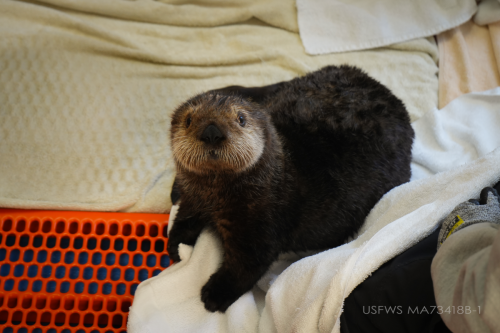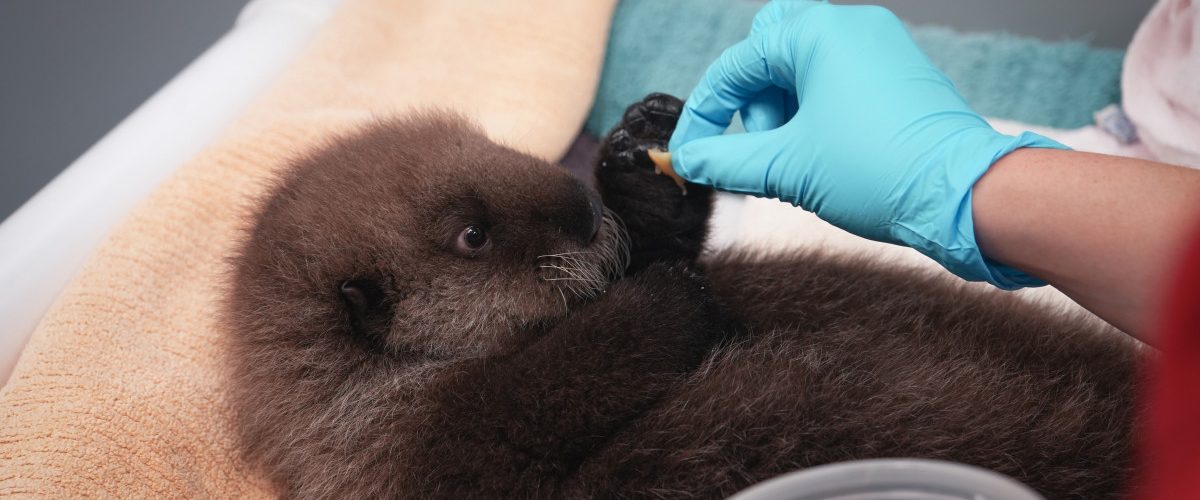The pups, found abandoned in Alaska, require 24/7 care by Zoo staff
(Apple Valley, MN) – October 27, 2023 – Northern sea otter pups are highly dependent on their mothers during their first several months of life. When a pup becomes orphaned, their chance of survival is drastically reduced.
Fortunately, the future of two recently orphaned female sea otter pups looks more optimistic thanks to the quick actions of Alaska SeaLife Center and their partnership with the Minnesota Zoo. After receiving initial triage care in Seward, Alaska, for several weeks, the pups have been brought to the Minnesota Zoo to continue receiving 24/7 care.
Named Denali (after the tallest peak in North America) and Nuka (after the Alaskan island off the Kenai peninsula), the young pups already have an extensive life story.
Nuka was found on September 9, when she was just days old. An off-duty staff member with Alaska SeaLife Center (ASLC) witnessed an orca attack on Nuka and her mother. Nuka’s mother never surfaced after the attack, leaving Nuka stranded. Working with the U.S. Fish and Wildlife Service (USFW), ASLC deployed their Wildlife Response team, and brought Nuka into their care.
Just days before this incident, ASLC received reports of an abandoned otter pup in an uncommon area for sea otters – 5 miles up a river, on land near Kenai, Alaska. The pup, now named Denali and currently estimated to be close to 5 months old, appeared malnourished and dehydrated. With no mother found near, ASLC, with permission from USFW, brought the pup into their care.
After beginning extensive rehabilitation care on the two pups, ASLC welcomed staff from the Minnesota Zoo, who spent several weeks providing care alongside ASLC staff in preparation for the sea otters’ journey to Minnesota. The Minnesota Zoo and ASLC have a long partnership. The Zoo’s three adult male sea otters were rescued by ASLC after being found abandoned as pups nearly 17 years ago.

Denali and Nuka, now in the care of the Minnesota Zoo, are receiving around-the-clock care, which includes extensive health monitoring and assistance with eating, grooming, and swimming.
“It’s always a challenge working with such young animals, because their health status can change so rapidly,” said Dr. Anne Rivas, Minnesota Zoo Director of Animal Health. “Bringing in these otters that do have a little more uncertainty in their medical history adds another layer of difficulty,” added Dr. Rivas.
“We have separate spaces set up for each of the otters,” explained Kurt Heizmann, Minnesota Zoo Director of Animal Care. “One will be in our reserve pools, separated from our three resident male sea otters, while the youngest otter will be cared for in her own behind-the-scenes nursery.”
The two pups still have a long health journey ahead and will require close monitoring for several more weeks. They will remain behind-the-scenes for the next few months as they continue to grow and acclimate. The Zoo will continue to share updates on Denali and Nuka’s progress via social media in the days and weeks ahead.
The Minnesota Zoo is a year-round destination providing a window into the natural world. With hundreds of species of animals, worldwide conservation efforts, and acres of scenic beauty, the Zoo is a resource to connect people, animals and the natural world to save wildlife. For more information visit mnzoo.org. The Minnesota Zoo is an accredited member of the Association of Zoos and Aquariums (AZA) and an institutional member of the World Association of Zoos and Aquariums (WAZA).






